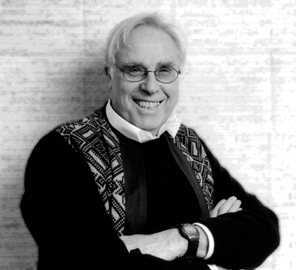Dr. George M. Martin
George M. Martin, M.D., FAAAS is Professor Emeritus, Departments of Pathology and Genome Sciences, University of Washington, Seattle, Washington. He was Director of the Alzheimer’s Disease Research Center at the University of Washington from 1985 to 1999.
George is not as well known as some of today’s leading futurists, such as Ray Kurzweil and Vernor Vinge, but some of his futuristic predictions are similar and predated those of Kurzweil and Vinge. For example, in 1971, George described the importance of exponential growth in science and, based on the continuation of such a trend, he outlined a hypothetical proposal for achieving “immortality” through a process now described as mind uploading:
“The ultimate solution [for immortality] is pure science fiction. In fact, the rationale for implementing the interim solution is largely based upon two articles of faith. The first is the perfectly reasonable proposition that science will continue to grow — if not at its present exponential rate, at least linearly. The second, requiring a good deal more optimism, is the belief that Homo sapiens, during this critical phase of his natural history, will not destroy himself and his planet. We shall assume that developments in neurobiology, bioengineering and related disciplines… will ultimately provide suitable techniques of ‘read-out’ of the stored information from cryobiologically preserved brains into nth generation computers capable of vastly outdoing the dynamic patterning of operation of our cerebral neurones. We would then join a family of humanoid ‘post-somatic’ bio-electrical hybrids capable of contributing to cultural evolution at rates far exceeding anything now imaginable.”George’s research has involved genetic approaches to elucidate the pathobiology of aging and age-related diseases. This has included basic research leading to the discovery of the genetic defect causing the Werner syndrome and certain familial forms of Alzheimer’s disease. His laboratory was also the first to demonstrate the rising frequencies, with age, of somatic mutations in human epithelial cells. At a more clinical level, George has systematized our knowledge of human genetic disorders from the point of view of their rich potential to elucidate specific aspects of the senescent phenotype and used this analysis to make inferences concerning the polygenic basis of aging.
He is on the Editorial Boards of Aging Cell, Ageing Research Reviews, The FASEB Journal, Geriatrics & Gerontology International, Age and Ageing, and Mechanisms of Ageing and Development. He was Founding Editor-in-Chief of Science of Aging Knowledge.
George was elected Fellow of the American Association for the Advancement of Science in 1982. He was awarded the Humboldt Distinguished Scientist Award from the University of Wurzburg, Germany in 1991. He received the Research Medal from the American Aging Association in 1992. He received the Robert W. Kleemeier Award from the Gerontological Society of America in 1993. He received the Irving Wright Award of Distinction from the American Federation for Aging Research in 1996. He received the Distinguished Scientist Award from the University of Urbino, Italy in 1998. He received a Lifetime Achievement Award from the World Alzheimer’s Congress in 2000. He received the IPSEN Foundation Longevity Prize in 2001.
He coedited Chromosomal Instability and Aging: Basic Science and Clinical Implications, and coauthored Positional Cloning of the Werner’s Syndrome Gene, Genetic Linkage Evidence for Familial Alzheimer’s Disease Locus on Chromosome 14, Alzheimer’s Presenilin Mutation Sensitizes Neural Cells to Apoptosis Induced by Trophic Factor Withdrawal and Amyloid β-Peptide: Involvement of Calcium and Oxyradicals, Extension of Murine Life Span by Overexpression of Catalase Targeted to Mitochondria, and Neurotrophic factors [activity-dependent neurotrophic factor (ADNF) and basic fibroblast growth factor (bFGF)] interrupt excitotoxic neurodegenerative cascades promoted by a PS1 mutation.
George earned his B.S. in Chemistry at the University of Washington in 1948 and his M.D. in Medicine at the University of Washington in 1953. He did his Internship at the Montreal General Hospital in 1954 and his Residency at the University of Chicago until 1957.
